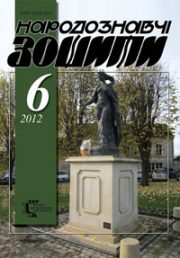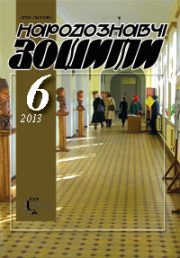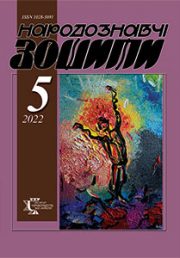The Ethnology Notebooks. 2022. № 1 (163), 113—122
UDK 398.41(=161.2)”1920/1930″:001.891-057.4А.Фішер
DOI https://doi.org/10.15407/nz2022.01.113
HALAICHUK Volodymyr
- ORCID ID: https://orcid.org/0000-0001-7780-5876
- Doctor of Sciences in the field of History,
- Associate Professor of the Department of Ethnology,
- Ivan Franko National University of Lviv,
- 1, Universytetska Str., 79000, Lviv, Ukraine,
- Contacts: e-mail: halay_czuk@ukr.net
TARNAVSKYI Roman
- ORCID ID: https://orcid.org/0000-0002-7817-6730
- Doctor of Sciences in the field of History,
- Associate Professor of the Department of Ethnology,
- Ivan Franko National University of Lviv,
- 1, Universytetska Str., 79000, Lviv, Ukraine,
- Contacts: e-mail: roman.tarnavskyi@lnu.edu.ua
Abstract. Formulation of the problem. A. Fischer’s activity laid the foundations for the formation of a powerful ethnographic and ethnological center at Lviv University during the 1920s and 1930s. The purpose of the investigation is to find out how the demonological ideas and beliefs of Ukrainians are represented in the works of the representatives of this school. The relevance of the article is determined by the need to study traditional spiritual culture. The source base was university courses, sections of ethnographic and local folklore research, small explorations and full-fledged monographs on demonological ideas and beliefs, authored by A. Fischer and his followers. The methodology of the article is based on the complex involvement of a number of general scientific methods, the main of which was the method of typological analysis.
It was found that A. Fischer attracted information about the demonological ideas of Ukrainians in his lecture courses, used them in the monograph «Rusyns», in essays on folk culture of the population of Lviv, Stanislaviv and Ternopil provinces. Information on the demonology of Ukrainians can be found in J. Falkowski, in particular in «Essays on Folk Culture of Ternopil Voivodeship», in monographs «On the Lemko-Boyko border» and «Northeastern border of Hutsul region», in a separate survey of the domestic spirit. According to the acts of court proceedings of the XV—XVIII centuries K. Koranyi studied demonology, — his article «Bald Mountain» deserves special attention, which describes in detail the belief in witches. Ukrainian ethnographic material has taken a significant place in the monographs of G. Perls («Snake in the beliefs of the Polish people») and J. Gaek («Rooster in folk beliefs»). K. Dobryansky prepared a number of meaningful investigations into Ukrainian demonology, among which the work «Witchcraft in the Sambir Region» stands out. R. Harasymchuk and V. Tabor touched upon the demonological ideas of the Hutsuls in the study «Ethnography of Hutsul Mountains».
In general, the works of representatives of the ethnological school of A. Fischer show that demonological ideas are an important component of the vast majority of spheres of folk culture of Ukrainians.
Keywords: demonology, beliefs, spiritual culture, Lviv University, Adam Fischer Lviv Ethnological School.
Received 28.01.2022
RЕFЕRЕNCЕS
- Tarnavskyі, R. (2016). Department of Ethnology, Lviv University. Classical period (1910—1947). Lviv [in Ukrainian].
- (1922). Jagiellonian University in Krakow. List of lectures for the 1922/23 school year (three trimesters). Krakow [in Polish].
- Archives of the Polish Ethnological Society. No. inv. 78/I & II. Fischer Adam. Slavic demonology. Part I & II. Lectures (Manuscript) [in Polish].
- (1926). Jagiellonian University in Krakow. List of lectures for the 1926/27 school year (three trimesters). Krakow [in Polish].
- Archives of the Polish Ethnological Society. No. inv. 22. Fischer Adam. Slavic mythology (Manuscript) [in Polish].
- (1930). Jagiellonian University in Krakow. List of lectures for the 1930/31 academic year (three trimesters). Krakow [in Polish].
- Archives of the Polish Ethnological Society. No. inv. 16. Fischer Adam. Soul and spirits in Slavic folk beliefs (Manuscript) [in Polish].
- State Archives of Lviv Oblast. Fund 26. Description 2. Case 185. Brukchnalski Andzchеi (case of graduation) (1928—1932) [in Ukrainian].
- Archives of the Polish Ethnological Society. No. inv. 352/329. Webersfeld Kchrushchielova Irena. «The devil in folk beliefs». Inventory of the Archives of the Polish Ethnological Society. History and characteristics of the collection. Polish Folklore Society, access received 20.08.2020. URL: http://ptl.info.pl/zbiory-archiwalne/katalog, 7 [in Polish].
- State Archives of Lviv Oblast. Fund 26. Description 2. Case 1389. Pеrls Hеnryc (Hеnakch) (case of graduation) (1928—1930) [in Ukrainian].
- Archives of the Polish Ethnological Society. No. inv. 301. Perls Henryk. From research on the population in Polish literature XVIII c. I. Population in the work and life of Franciszek Karpinski; II. «The devil in his form» by Jan Bohomolec [in Polish].
- State Archives of Lviv Oblast. Fund 26. Description 2. Case 744. Nеstiuk-Ivanchuk Іryna (case of graduation) (1932—1936) [in Ukrainian].
- State Archives of Lviv Oblast. Fund 26. Description 2. Case 597. Dobrianski Kalistrat (case of graduation) (1930—1937) [in Ukrainian].
- State Archives of Lviv Oblast. Fund 26. Description 2. Case 1966. Schminda Maria Janina (case of graduation) (1935—1939) [in Ukrainian].
- Fischer, A. (1922). Domowy (Fragment from studies on Slavic demonology). Ponowa. Pismo poswiecone poezji i sztuce (Vol. 4, pp. 298—304). Warsaw [in Polish].
- Fischer, A. (1928). Djabeі in the beliefs of the Polish people. Old Polish Studies. A book in honor of Alexander Bruckner (Pp. 198—209). Krakow [in Polish].
- Archives of the Polish Ethnological Society. No. inv. 15. Fischer Adam. The devil in the beliefs of the Polish people (Manuscript) [in Polish].
- Fischer, A. (1926). Tales of witches from the Nowotarska Valley. Lud (Vol. XХV, pp. 78—94). Lviv [in Polish].
- Archives of the Polish Ethnological Society. No. inv. 45. Adam Fischer. General literature bibliography on the topic: Witchcraft and witches in Poland (Manuscript) [in Polish].
- Archives of the Polish Ethnological Society. No. inv. 20. Fischer Adam. Penance spirits (Manuscript) [in Polish].
- Archives of the Polish Ethnological Society. No. inv. 21. Fischer Adam. Journeys of the Souls of the Dead (Mp.) [in Polish].
- Archives of the Polish Ethnological Society. No. inv. 18. Fischer Adam. Slavic gods of fertility (Manuscript) [in Polish].
- Kujawska, M., Luczaj, L., Sosnowska, J., & Klepacki, P. (Ed.). (2016). Plants in folk beliefs and customs. Adam Fischer’s Dictionary. Wroclaw [in Polish].
- Archives of the Polish Ethnological Society. No. inv. 356. Materials about plants: 1) Materials by prof. A. Fischer; 2) Materials of the Department of Ethnography and Ethnology at the MCSU in Lublin (Manuscript, mp.) [in Polish].
- Archives of the Polish Ethnological Society. No. inv. 74. Fischer Adam. Plants in folk beliefs and rituals (Mp.) [in Polish].
- Archives of the Polish Ethnological Society. No. inv. 136. Fischer Adam. Trees in the beliefs and rituals of the Polish people (Mp.) [in Polish].
- Archives of the Polish Ethnological Society. No. inv. 355. Bibliography on the topic: plants (Manuscript, mp.) [in Polish].
- Fischer, A. (1921). Funeral customs of the Polish people. Ethnological monograph. Lviv [in Polish].
- Fischer, A. (1928). Rusini. An outline of the ethnography of Rus. Lviv; Warsaw; Krakow [in Polish].
- Fischer, A. (1939). An outline of the ethnography of South-Eastern Poland. Lviv [in Polish].
- Archives of the Polish Ethnological Society. No. inv. 82. Fischer Adam. Ethnography of South-Eastern Poland (Mp., manuscript) [in Polish].
- Archives of the Polish Ethnological Society. No. inv. 28. Fischer Adam. Ethnographic outline of Stanisіawskie Voivodeship (Mp., manuscript) [in Polish].
- [Falkowskуi, J.] (1931). Outline of the folk culture of the Tarnopol voivodship. Tarnopol voivodship (Pp. 15—23). Ternopil [in Polish].
- Tarnavskyі, R. (2013). Jan Falkowski: life path and scientific and pedagogical activity. Bulletin of Lviv University. The series is historical (Vol. 48, pp. 410—431). Lviv [in Ukrainian].
- Falkowskуi, J., & Pasznyckуi, В. (1935). On the border between Lemko and Boyko. Ethnographic outline. Lviv [in Polish].
- Falkowskуi, J. (1938). North-eastern border of the Hutsul region. Lviv [in Polish].
- Falkowskуi, J. (1934—1935). Inkluz-djabeіek. About the method of obtaining a goldfish from an egg. Lud (Vol. XХXIII, pp. 78—79). Lviv [in Polish].
- Koranyi, K. (1926). Czary in court proceedings (Legal and ethnological sketch). Lud (Vol. XХV, pp. 7—18). Lviv [in Polish].
- Koranyi, K. (1927). Czary and gusla before the church courts in Poland in the fifteenth and first half of the sixteenth century. Lud (Vol. XХVI, pp. 1—25). Lviv [in Polish].
- Koranyi, K. (1928). The witches barrel. Lud (Vol. XХVII, pp. 110—111). Lviv [in Polish].
- Koranyi, K. (1930). Magic in Poland. Diary of the Second Congress of Slavic Geographers and Ethnographers in Poland in 1927 (Vol. II, pp. 194—196). Krakow [in Polish].
- Koranyi, K. (1928). Lysa Gora (Study of the history of folk beliefs in Poland in the 17‑th and 18‑th centuries). Lud (Vol. XХVII, pp. 57—74). Lviv [in Polish].
- Majewski, E. (1892). Waz in the speech, concepts and practices of our people. Wisla: Geographic and ethnographic monthly (Vol. VI, issue 1, pp. 87—140; issue 2, pp. 318—371). Warsaw [in Polish].
- Perls, H. (1937). Snake in the beliefs of the Polish people. Lviv [in Polish].
- Linkiewicz, O. (2019). Henryk (Henach) Perls (1904—1943). Polish ethnographers and scholars. Silhouettes, biographical sketches (Pp. 153—154) Krakow [in Polish].
- Gajek, J. (1934). Kock in folk beliefs. Lviv [in Polish].
- Archives of the Polish Ethnological Society. No. inv. 158. Dobrianski Kalistrat. Demonology of the Ukrainian people [in Polish].
- Dobrjanskуi, K. (1934—1935). Witchcraft in the Old Sambir region. Lud (Vol. XХXIII, pp. 117—126). Lviv [in Polish].
- Dobryanskyі, K. (1936). The color of the fern in Ukrainian folk beliefs. Zhyttia i znannia (Vol. 7—8, pp. 225—226). Lviv [in Ukrainian].
- Dobrianskyі, K. (1936). Witchcraft in the Old Sambir region (abbreviated). Zhyttia i znannia (Vol. 11, pp. 324—325). Lviv [in Ukrainian].
- Dobrianskyі, K. (1937). Domestic animals in Ukrainian folk beliefs. Zhyttia i znannia (Vol. 4, p. 104). Lviv [in Ukrainian].
- Dobrianskyі, K. (1937). Forest animals in Ukrainian folk beliefs. Zhyttia i znannia (Vol. 6, pp. 172—173). Lviv [in Ukrainian].
- Dobrianskyі, K. (1937). Thief’s grass. Zhyttia i znannia (Vol. 7—8, p. 221). Lviv [in Ukrainian].
- Dobryanskyі, K. (1937). Khmarnyk. Zhyttia i znannia (Vol. 7—8, p. 228). Lviv [in Ukrainian].
- Dobryanskyі, K. (1938). Spellcasters from the reptile bite. Zhyttia i znannia (Vol. 6, p. 166). Lviv [in Ukrainian].
- Dobrianskyі, K. (1940). Forest animals in Ukrainian folk beliefs. Svoboda: Ukrainian diary, 281, 3 [in Ukrainian].
- Harasymczuk, R.W., & Tabor, W. (1937). Ethnography of the Hutsul mountain meadows. Lud (Vol. XХXV, pp. 76—161). Lviv [in Polish].
- Voitovych, N. (2015). Folk demonology of Boykivshchyna. Lviv [in Ukrainian].
- Halaichuk, V. (2016). Ukrainian mythology. Kharkiv [in Ukrainian].
- Halaichuk, V. (2021). Traditional demonological ideas of Ukrainians about domestic spirits. Lviv [in Ukrainian].
- Kryvenko, A. (2020). Folk demonology of Volyn: calendar-ritual context. Lviv [in Ukrainian].
- Kuzminska, B. (2013). Demonology of Ukrainians of Opillia: author’s ref. dis. … cand. ist. science: 07.00.05. Lviv [in Ukrainian].
- Siletskyі, R. (2011). Traditional building rituals of Ukrainians. Lviv [in Ukrainian].







